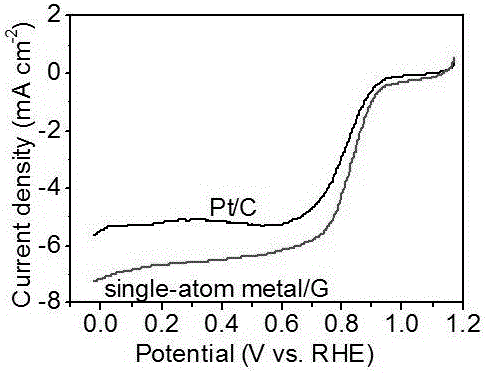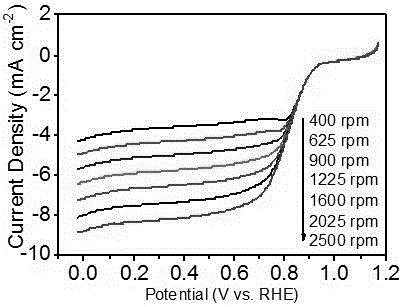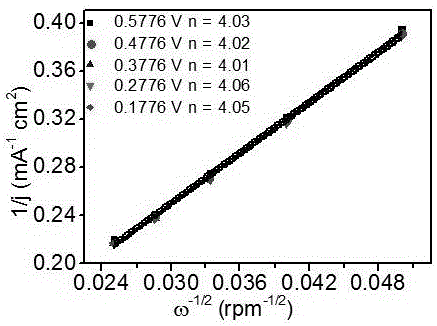Monodisperse metal atom/graphene composite catalyst and preparation method and application thereof
A graphene composite and metal atom technology, applied in the direction of catalyst activation/preparation, metal/metal oxide/metal hydroxide catalyst, physical/chemical process catalyst, etc. Reunion, monatomic higher problems
- Summary
- Abstract
- Description
- Claims
- Application Information
AI Technical Summary
Problems solved by technology
Method used
Image
Examples
Embodiment 1
[0116] (1) Using polytetrafluoroethylene (PTFE) as a binder, the sulfur-doped graphene powder was pressed into a self-supporting columnar electrode as the anode and cathode, and the thickness of the anode and cathode were both 5 mm. The mass ratio of PTFE to sulfur-doped graphene powder was 0.05 g / g. Both the anode and the cathode contain more than 50% graphite by mass, with a resistivity of 0.3 kohm·m (0.3 KΩ·m), pores, and a specific surface area of 4 square meters per gram (4 m 2 / g). The pressure of pressing the electrode is 45 MPa, and the temperature is 80 °C. Two types of electrodes, anode and cathode, form an array. The distance between anode and cathode is 1 mm). The anode and cathode are separated by polyethylene film. The polyethylene bags have an average pore size of 10 µm. (2) Apply a DC voltage of +8 V to -8 V between the anode and the cathode, electrolyze for 60 h, exchange the electrodes every 3 h, and control the electrolysis temperature at 40 °C. The ...
Embodiment 2
[0118] (1) Using polytetrafluoroethylene (PTFE) as a binder, the phosphorus-sulfur-doped graphene powder was pressed into a self-supporting columnar electrode as the anode and cathode, and the thickness of the anode and cathode were both 5 mm. The mass ratio of PTFE to phosphorus-sulfur-doped graphene powder is 0.05 g / g. Both the anode and the cathode contain more than 50% graphite by mass, with a resistivity of 0.3 kohm·m (0.3KΩ·m), pores, and a specific surface area of 4 square meters per gram (4 m 2 / g). The pressure of pressing the electrode is 45 MPa, and the temperature is 80 °C. Two types of electrodes, anode and cathode, form an array. The distance between anode and cathode is 1 mm. The anode and cathode are separated by polypropylene film. The polypropylene bags have an average pore size of 10 µm. (2) Apply a DC voltage of +8 V to -8 V between the anode and the cathode, electrolyze for 60 h, exchange the electrodes every 3 h, and control the electrolysis tempera...
Embodiment 3
[0120] (1) Using polytetrafluoroethylene (PTFE) as a binder, the phosphorus-sulfur-boron-doped graphene powder was pressed into a self-supporting columnar electrode as the anode and cathode, and the thickness of the anode and cathode were both 5 mm. The mass ratio of PTFE to phosphorus-sulfur-boron-doped graphene powder is 0.05 g / g. Both the anode and the cathode contain more than 50% graphite by mass, with a resistivity of 0.3 kohm•m (0.3 KΩ•m), pores, and a specific surface area of 4 square meters per gram (4 m2 / g). The pressure of pressing the electrode is 45 MPa, and the temperature is 80 °C. Two types of electrodes, anode and cathode, form an array. The distance between anode and cathode is 1 mm. The anode and cathode are separated by polyethylene film. The polyethylene bags have an average pore size of 10 µm. (2) Apply an AC voltage of 10 V between the anode and the cathode, electrolyze for 30 h, and change the direction of the current every 30 min. The electrolys...
PUM
| Property | Measurement | Unit |
|---|---|---|
| Thickness | aaaaa | aaaaa |
| Diameter | aaaaa | aaaaa |
| Average pore size | aaaaa | aaaaa |
Abstract
Description
Claims
Application Information
 Login to View More
Login to View More - R&D
- Intellectual Property
- Life Sciences
- Materials
- Tech Scout
- Unparalleled Data Quality
- Higher Quality Content
- 60% Fewer Hallucinations
Browse by: Latest US Patents, China's latest patents, Technical Efficacy Thesaurus, Application Domain, Technology Topic, Popular Technical Reports.
© 2025 PatSnap. All rights reserved.Legal|Privacy policy|Modern Slavery Act Transparency Statement|Sitemap|About US| Contact US: help@patsnap.com



